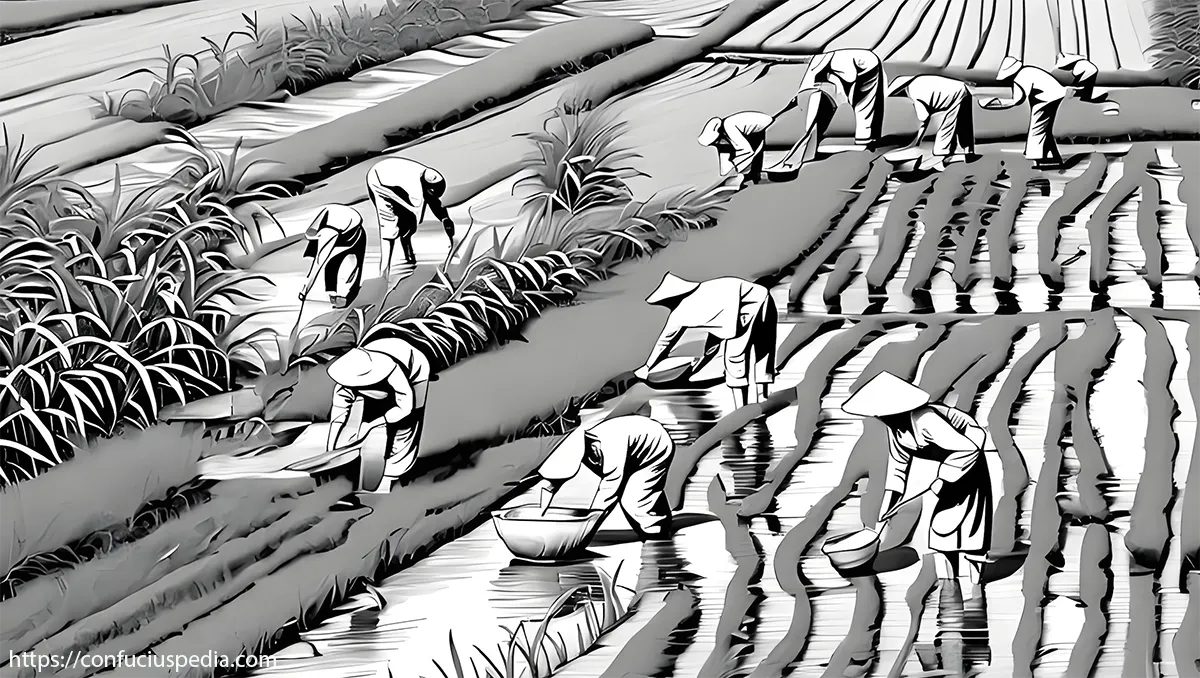When considering how to improve productivity or career development, we often look forward to learning from the wisdom of ancient people.
As the founder of Confucianism, Confucius’s profound insights into work are recorded concisely and comprehensively in The Analects of Confucius.
Confucius’s View of Career/Occupation
Confucius’s view of career focuses on the relationship between leaders and their subordinates.
For leaders/managers:
Firstly, leaders should show their benevolence, care about their subordinates’ work and lives, understand their needs, and protect their benefits to build more harmonious teams.
Secondly, leaders should set an example for their team members with their words and actions.
Finally, leaders should focus on selecting and developing talents and providing them with opportunities. At the same time, leaders should keep their word and advocate a diligent work style to avoid laziness and procrastination among subordinates.
For subordinates:
Firstly, subordinates need to execute tasks according to their leader’s instructions, but they should not unquestioningly comply. Instead, they should act based on their trust in the leader and understanding of the team’s goals.
Secondly, they should also remain loyal to leaders and show due respect to leaders to establish good relationships.
Finally, subordinates should strive to continuously learn and enhance their ability to adapt to the workplace’s evolving demands and challenges.
10 Confucius’s Quotes about Work
Confucius provided valuable guidance about work in his time and future generations.
In today’s fickle and complex social environment, we can also draw on Confucius’s wisdom and apply it to the workplace for better individual and team development.
- 道千乘之国,敬事而信,节用而爱人,使民以时。(From The Analects of Confucius: Xue Er)
Phonetic transcription (Pinyin): dào qiān chénɡ zhī ɡuó, jìnɡ shì ér xìn, jié yònɡ ér ài rén, shǐ mín yǐ shí.
Translation: In a country of a thousand war chariots, said the Master, the ruler should be respectful in deed and faithful in word, thrifty in expenditure and affectionate towards the people and tell them to labor at the proper times of the year.
Interpretations: This quote suggests that influential leaders should be diligent and trustworthy in their work and care for their subordinates. They should also be capable of efficiently utilizing resources and seizing opportunities.
2. 工欲善其事,必先利其器。(From The Analects of Confucius: Duke Ling of Wey)
Phonetic transcription: ɡōnɡ yù shàn qí shì, bì xiān lì qí qì.
Translation: A craftsman who wishes to do his work well must first sharpen his tools.
Interpretations: This quote aims to draw people’s attention to two aspects. Firstly, individuals need to be well prepared before starting a task to ensure that it can be done effectively. Secondly, leaders should closely monitor team members’ strengths and maximize their potential.
3. 道之以政,齐之以刑,民免而无耻;道之以德,齐之以礼,有耻且格。(From The Analects of Confucius: The Way of Governance)
Phonetic transcription: dào zhī yǐ zhènɡ, qí zhī yǐ xínɡ, mín miǎn ér wú chǐ; dào zhī yǐ dé, qí zhī yǐ lǐ, yǒu chǐ qiě ɡé.
Translation: If the people are governed by laws, said the Master, and order is kept by punishment, they would be obedient but not conscientious. If they are led by virtue and order is kept by the rites, they would be conscientious and act in agreement with what is right.
Interpretations: This quote reminds us that in addition to influencing and guiding team members through words and actions, leaders should also focus on cultivating their moral qualities and enhancing their self-restraint capability.
4. 子为政,焉用杀?子欲善而民善矣。(From The Analects of Confucius: The Way of Governance)
Phonetic transcription: zǐ wéi zhènɡ, yān yònɡ shā? zǐ yù shàn ér mín shàn yǐ.
Translation: In carrying on your government, why should you use killing at all? Let your evinced desires be for what is good, and the people will be good.
Interpretations: According to Confucius, leaders should set an example for subordinates who will naturally imitate the role model, thus forming a positive working atmosphere.
5. 施,取其厚;事,举其中;敛,从其薄。(From the Spring and Autumn Annals: Zuo Zhuan)
Phonetic transcription: shī, qǔ qí hòu; shì, jǔ qí zhōnɡ; liǎn, cónɡ qí bó.
Translation: Give more rewards and benefits, assign reasonable workloads, and avoid severe punishment.
Interpretations: As a leader, you should reward your subordinates, assign tasks reasonably, and avoid overly harsh punishments.
6. 君于惠而不费,劳而不怨,欲而不贪,泰而不骄,威而不猛。(From The Analects of Confucius: Yao Yue)
Phonetic transcription: jūn yú huì ér bù fèi, láo ér bù yuàn, yù ér bù tān, tài ér bù jiāo, wēi ér bù měnɡ.
Translation: The Master said, “When the person in authority is beneficent without great expenditure; when he lays tasks on the people without their repining; when he pursues what he desires without being covetous; when he maintains a dignified ease without being proud; when he is majestic without being fierce.”
Interpretations: Leaders should offer appropriate benefits to subordinates. When assigning tasks, leaders need to thoroughly consider subordinates’ abilities and expectations to avoid dissatisfaction or complaints due to overburdening or unsuitable tasks. Additionally, leaders should remain humble and low-key while exercising their power.
7. 以不教民战,是谓弃之。(From The Analects of Confucius: Zi Lu)
Phonetic transcription: yǐ bù jiào mín zhàn, shì wèi qì zhī.
Translation: It would be a useless sacrifice, said the Master, to employ untrained people in war.
Interpretations: In their work, leaders should focus on training their team members, providing them with the necessary guidance and support, and helping them continually improve their abilities to realize the team’s vision better.
8. 多闻阙疑,慎言其余,则寡尤;多见阙殆,慎行其余,则寡悔。言寡尤,行寡悔,禄在其中矣。(From The Analects of Confucius: The Way of Governance)
Phonetic transcription: duō wén quē yí, shèn yán qí yú, zé ɡuǎ yóu; duō jiàn quē dài, shèn xínɡ qí yú, zé ɡuǎ huǐ.yán ɡuǎ yóu, xínɡ ɡuǎ huǐ, lù zài qí zhōnɡ yǐ.
Translation: Hear much, put aside what is doubtful, and be cautious when speaking of the rest; then, you would be less to blame. See much, put aside what is risky, and be careful in doing the rest; then you would regret the less. If your words are seldom blamed and your deeds seldom regretful, then you need not worry about official emoluments.
Interpretations: Confucius recommended that people observe, understand, and do more but talk less in their work, especially when doubtful. As such, there will be fewer mistakes and regrets, greater efficiency and quality of work, and, ultimately, more opportunities and rewards.
9. 举直错诸枉,则民服;举枉错诸直,则民不服。(From The Analects of Confucius: The Way of Governance)
Phonetic transcription: jǔ zhí cuò zhū wǎnɡ, zé mín fú; jǔ wǎnɡ cuò zhū zhí, zé mín bù fú.
Translation: If honest men are employed and dishonest ones discarded, then people will support you. If dishonest men replace the honest, you will lose the support of the people.
Interpretations: This quote emphasizes the importance of leaders in selecting the right talents. Leaders should appoint virtuous individuals and leverage their strengths in the workplace to ensure their teams’ stability and development.
10. 居上不宽,为礼不敬,临丧不哀,吾何以观之哉? (From The Analects of Confucius: Eight Yis)
Phonetic transcription: jū shànɡ bù kuān, wéi lǐ bù jìnɡ, lín sànɡ bù āi, wú hé yǐ ɡuān zhī zāi?
Translation: High office filled without generosity, said the Master, ceremony performed without reverence, and mourning observed without grief, how can I bear to see such things!
Interpretations: This quote highlights the importance of tolerance in the workplace. Leaders who show more kindness and forgiveness to their subordinates are more likely to be loved and respected, thus achieving more effective work.

